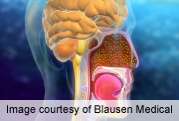(HealthDay)—Statistical and measurement evidence validates the comparison of the 22-item Sinonasal Outcome Test (SNOT-22) responses or scale scores before and after endoscopic sinus surgery to quantify changes in symptoms and dysfunctions in patients with chronic rhinosinusitis (CRS), according to a study published online June 26 in JAMA Otolaryngology.
Adam S. DeConde, M.D., from the Oregon Health & Science University in Portland, and colleagues evaluated pre- and postoperative data from the SNOT-22 survey from a population-based sample of adults with CRS who elected surgical intervention for continuing medically refractory symptoms. Models were estimated to test structure, potential response shifts, and true change in the SNOT-22 scores.
The researchers found that, based on the 339 participants completing both evaluations, five correlated, yet distinguishable, underlying factors were revealed in analysis of SNOT-22. The largest impact of endoscopic sinus surgery was seen across these factors with regard to rhinologic symptoms (P < 0.001) and extranasal rhinologic symptoms (P < 0.05). A smaller, but significant effect was seen across the other three factors: ear/facial symptoms (P < 0.001), psychological dysfunction (P < 0.05), and sleep dysfunction (P < 0.001).
"Participants undergoing endoscopic sinus surgery experience only clinically insignificant response shifts, validating assessment of change through use of presurgery and postsurgery SNOT-22 responses," the authors write.
More information:
Abstract
Full Text (subscription or payment may be required)
Copyright © 2014 HealthDay. All rights reserved.





















